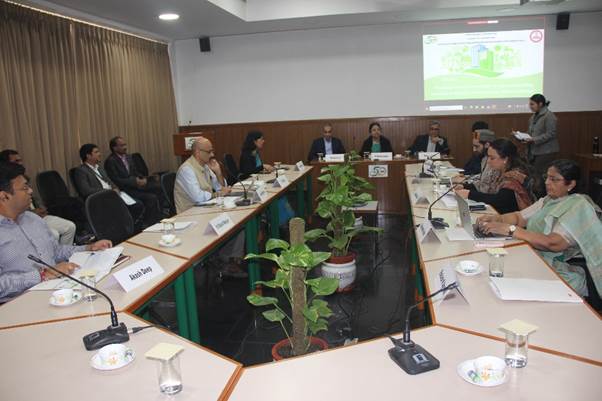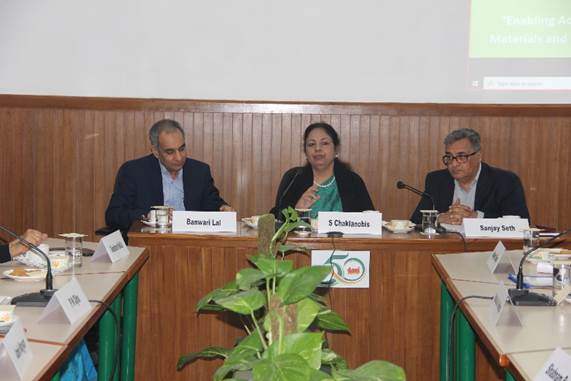In a ground-breaking collaboration, the Department of Scientific & Industrial Research (DSIR) partnered with The Energy and Resources Institute (TERI) to drive transformative advancements in India’s construction and wastewater treatment sector. It was an effort to align “Access to Knowledge for Technology Development and Dissemination (A2K+) Studies” Scheme of DSIR with India’s Smart Cities Mission and its commitment to becoming a net-zero emitter by 2070.
DSIR has awarded two research studies to TERI with the intent to bridge the information gap on advanced building materials and building design for achieving energy efficiency and to make a status and scoping report on membrane-based sewage wastewater treatment systems for reuse and recycling. In this regard, a DSIR-TERI, collaborative Stakeholder Consultant Meeting with key decision-makers was held today at India Habitat Center, New Delhi.
The event was attended by esteemed experts from the academia, Industry leaders and policy makers. Dr. Sujata Chaklanobis, Scientist ‘G’ and Head A2K+ Studies, Department of Scientific & Industrial Research (DSIR), Ministry of Science and Technology, Govt. of India, stressed on the need to promote industrial research for indigenous technology development, promotion, utilization, and transfer. Mr. Sanjay Seth, Senior Director of the Sustainable Infrastructure Programme at The Energy and Resources Institute (TERI) and Vice President & CEO of the GRIHA Council, set the tone for the day with his welcome remarks.
Mr. Seth, said, “India’s commitment to carbon neutrality by 2070 emphasizes the crucial need for substantial reductions in greenhouse gas emissions, particularly from the building sector. Achieving this ambitious goal hinges on the imperative integration of cutting-edge technologies and design within buildings, a key strategy to significantly curtail energy consumption and propel us toward a sustainable, low-carbon future.” Delivering the opening remarks, Dr. Banwari Lal, Sr. Director, TERI, said, “Membrane technology, a favorite choice in the water treatment landscape, emerges as a vital solution for reclaiming water from diverse wastewater streams.
As the need for water reuse intensifies, the treatment of sewage water becomes not just a necessity but a strategic imperative to meet growing water demands sustainably.” Dr. Sujata Chaklanobis, Scientist G, DSIR and Head A2K+ Studies DSIR, emphasised the need to have study reports on important issues regarding sustainability and inclusivity and was instrumental in steering the dialogue. The first session focussed on enabling access to emerging technologies and innovative solutions for advanced building design to enhance energy efficiency.
The panelists Ms. Chitrarekha Kabre, Professor, SPA; Mr. S. Vikash Ranjan, Chief Executive Officer of Pledge4Earth; Dr. Abdullah Nisar Siddiqui, Mr. Amin Nayyar, Ms. Shabnam Bassi, Mr. Akash Deep, and, Dr. Vandana Kalia, Scientist, DSIR gave insightful suggestions and information. Their collaborative conversations and insightful perspectives enhanced the dialogue on progressing energy-efficient building design and sustainable construction practices, laying the groundwork for inventive solutions in India’s construction sector.
The second session of the stakeholder consultation was moderated by Dr. Banwari Lal, Sr. Director, TERI and the overview of meeting was presented by Dr. Veeranna Channashettar, Associate Director, TERI, highlighting the current status, membrane technologies in India for sewage treatment. Prof. Vivek Kumar, IIT-Delhi, Dr. Selvaraju Narayanasamy IIT Guwahati, Dr. Vidya S Batra, Senior Fellow, TERI, Dr. Ranjeet Bairwa, Scientist, DSIR provided insights in the status and contribution of Indian academia in the area of membrane-based technologies and its commercialization to treat and reuse wastewater.
The experts shared profound insights from their research expertise, shedding light on the gaps and opportunities for research and commercialization in the near future. The industrial experts Mr. Sridhar Padmanaban, Senior Vice-President, Ion Exchange and Mr. Sarthak Bagai, Director, S R Paryavaran Group, Panchkula provided details of current membrane market, innovation, and opportunities in Indian and international companies.
The in-depth input from academia, industry and end user made the deliberations interesting and provided useful inputs for a future road map. The event concluded with a commitment from both partners to embark on the journey of innovation for a sustainable and resilient future.







